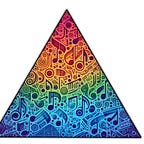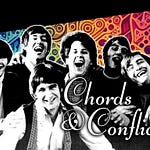This is Chords & Conflict: Exploring Song Drama, where I discuss songs I like that have drama triangle angles in them. I believe I’ve successfully made “Chords & Conflict” into a Substack Section, which means if you’re interested in The Drama of It All, but not this section, you should be able to unsubscribe to “Chords & Conflict,” but stay subbed to The Drama of It All, but I hope you read on. This one is very interesting!
If I’m picking songs apart, I’m doing that because I like the particular song. The song will definitely be on my playlist, which means I’m listening to it which is why my mind is begging me to write about it. I won’t dissect songs I hate and never hear.
Yesterday while cleaning my house, I was listening to and loving the song “You Better You Bet” by The Who.
This is a song about an abusive relationship. Here are a few of the specific lyrics I want to reference:
I don't really mind how much you love me
Ooh, a little is alright
When you say, come over and spend the night
Tonight, tonight….
[Chorus]
When I say I love you, you say you better
You better, you better you bet
When I say I need you, you say you better
You better, you better you bet
[Post-Chorus]
You better bet your life
Or “love” will cut you, cut you like a knife….
You better love me, all the time now
You better shove me back into line now
You better love me, all the time now
You better shove me back into line now
Like all relationships, it takes two. The singer believes that this treatment is okay. He likely does believe he loves the woman. I know that it’s common for people in abusive relationships to feel like they actually love the person who is abusing them. If they didn’t, then they wouldn’t feel so drawn to the relationship. That feeling of being drawn to the relationship comes from being accustomed to abuse from childhood on. It’s what feels normal to them. So they often act as if it’s a normal relationship or “not as bad” as others would say it was. So, it’s no surprise to me that this song is sung in a way that makes it feel normal.
That doesn’t make it less abusive. It’s almost a gaslight to us (except in this case it’s unintentional). The abuse should have been obvious by the command, “You better.” But it’s more obvious when you see threats that “‘love’ will cut like a knife.” I always misheard that as “I’ll cut you like a knife,” which is a threat. It’s possible that this line is not written to be a threat, but a statement on how if you love someone then eventually what they do or don’t do will impact your emotional state and inevitably you will feel pain. But it sounds more like a threat to me in this context. The singer also sings, “You better shove me back into line now,” again referencing that he’s okay with this abusive relationship.
Rescue Me With Your Love
A lot of people who are lonely feel like victims as if loneliness were a persecutor. These sorts of people look to possible mates as if they are “saviors” or “rescuers” dispatching the loneliness and all consequences of feeling like a failure of not being in a relationship.
They can start to idolize the mate, because they do not believe they could feel content by themselves. They feel something like a desperate need for the person to stay, in order to keep them from ever facing that loneliness again.
These people attract others who want to play Savior to them. The woman in the song is a perfect example. When everything is going good between them, the woman (and others like her) enjoy being “worshipped.” But, if there is a hint that they are no longer being worshipped and they are now being seen as a faulty human, they can get pissed. They will turn into a “persecutor” saying things like, “You better love me, all the time now,” and “You better bet your life or ‘love’ will cut you, cut you like a knife.”
Healthy people will not threaten each other in order to be “loved.” They will appreciate hearing that they’re loved, like a humble person. The fact that she says, “You better,” shows how narcissistic she is because she assumes she should be loved.
There is a desire and (assumption of their own worthiness) to be worshipped by these sorts of narcissists.
Sometimes this is not seen just in romantic relationships, but in parental relations. A mother or father might say, “I brought you into this world, I can take you out. You should respect (meaning worship) me.”
Parasocial Relationships
To learn more about parasocial relationships, I would suggest checking out a couple of articles from HollyMathNerd.
Basically, people see someone online or on TV, or listen to them on the radio, or reading them online and start to feel as if they truly know the person, while the person being listened to knows nothing of the viewer/listener. It’s a lopsided “relationship” that is inauthentic because it does not actually exist for both parties.
It can happen that audience members believe they truly know the person they’re reading or listening to, but they do not.
I’ve had the pleasure of meeting some people who found me online because of my YouTube videos and Facebook presence. We had some good times. But now I don’t speak to any of them. They all got the wrong impression of me. Because we’d talked on the phone plenty of times we were able to have good times in person. But they had overlays, or impressions of who I was. One in particular saw me as her “savior,” with the knowledge I would discuss with her, and then turned around and viewed me as a “victim” whom she needed to “rescue.” That was the beginning of my understanding of the Drama Triangle.
I will not put up with people doing that to me. I appreciate the kind comments from people who enjoy what I write. But if you assume you know me and what I need and try to “rescue” me like I’m a “victim,” I will stop it (the communication). After I wrote the last article, something like that happened again.
And, although I’ve wanted to write an article about this particular song for a while, it wasn’t until yesterday that it all felt right. And, that’s because of this.
Parasocial Hero Worship & Backlash
Viewers, listeners, and readers love to think they know who they are following. They think all the bits and pieces they’ve heard let them know who that person is in the “real world.” But, as I’ve said, they’re wrong.
And audience members can act like “victims” of a lack of knowledge or insight, who see a podcaster or writer as a “savior” doing all of the work for them. I know some people who listen to a show like Disaffected Newsletter and feel like “if he’s doing this, then I don’t have to.” We all have to take personal responsibility and enforce our boundaries personally. We cannot say just because this or that person is doing it, then I don’t have to. And, as for knowledge, you still are personally responsible for checking if someone is telling the truth. You ultimately have to rely on yourself.
Eventually those people in those parasocial relationships will see or hear something they didn’t expect, which shatters the overlay that they placed on the person. Please watch this video for more information on overlays. It’s more specifically about romantic relationships, but it works extremely well for parasocial relationships with content creators.
The Backlash After the Overlay Spell Is Broken
Once the overlay spell is broken, the follower can no longer see the creator as a “savior” and then shifts that person into the “persecutor” or “victim” role. It’s usually the “persecutor” role. But if they choose to view the creator as a “victim,” they will start commenting with solutions or knowledge to try to “rescue” the creator from falsehoods. If they choose to view the creator as a “persecutor” now, they will start with (usually verbally/written) attacks or threatening them. They may go on a smearing rampage on social media as well, to try to “save” protentional audience members” from the “evil creator.”
If you are a creator and you’ve experienced this, I hope you now understand more clearly what happened and why.
If you think back to the song, and think about a situation where a creator has said or written something thanking their audience, consider that there are some viewers/listeners out there feeling, “You better bet your life or ‘love’ will cut you, cut you like a knife.” It’s not that they’re literally thinking this way. They’re not conscious of it because they think they know the person.
But, as soon as the overlay breaks, it comes out.
The Newsroom Reference
This clip is from the premiere episode of Season 2 of the The Newsroom. In this scene, Will McAvoy describes this song as how he feels like his relationship with his audience plays out. At one point it sounds like he’s ready to call it a “really demented relationship” but that word gets caught off and he never returns to it. He does say “that person’s just mean.”
I think it’s beyond mean. It’s abusive. And it is demented. And I don’t have those relationships with anyone in my local “real world.” People are way more interested in asking questions to get to know a person when talking to them in person. They don’t assume they know all about you already. I’m considering staying away from social media interactions, beyond writing articles, and may change my comment section in the future if it gets too bad.
I apparently “frightened” someone by saying I won’t put up with this entitled attitude. When people who like to break boundaries get told there is a boundary that will be enforced, they think you’re being mean. That’s projection.
BTC Donation Address: bc1q4s6h8rhyqawqlz46ppc3zc5v43duycp8m57h9p








